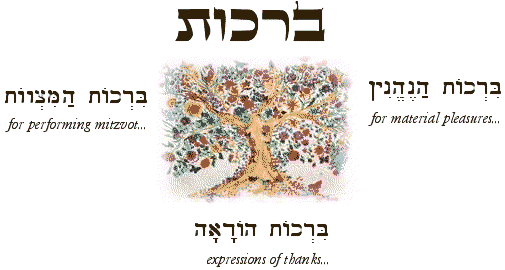|
|
|||||||||||||||||||||
 |
|||||||||||||||||||||
|
Learn Hebrew |
|||||||||||||||||||||
 |
|||||||||||||||||||||
|
Blessings Book |
|||||||||||||||||||||
|
Hebrew Berachot - |
||||||
|
Types of Common Hebrew Blessings |
||||||
|
I will bless the LORD at all times; his praise shall continually be in my mouth. |
|
|
||||||||||||||||||||||||||||||||||||||||
|
by practicing kavanah (intention) |
|||
|
and finding gratitude |
|||
|
When we take the time to focus our minds and recite a blessing in response to a life event (no matter how seemingly insignificant), we transform the knee-jerk habits of our mundane experience to moments of profound sanctity. We translate the profane moments to those of the sacred. We come to see and understand that life is a gift to us. |
 |
|||||
|
Engaging the mind with the awareness that God is the Source of all that is good is a means, then, of increasing your joy in this life.
|
|||||
 |
|||||
|
As followers of Yeshua the Mashiach, blessed be He, we are not constrained to follow rabbinic halakhah (rules). We are free to spontaneously offer up praise and thanks to the LORD for all things, regardless of time or place. And such will be our practice if we are living in genuine emunah (faithfulness) before the LORD, for we will be given the Holy Spirit with "joy unspeakable and full of glory" as we dwell within His Presence. |
|
|
|
Hebrew for Christians |
|||||
|
|||||
